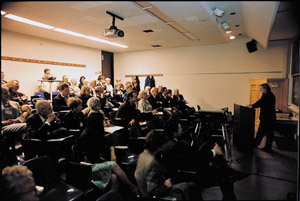Chicago:
Campus of the Big Ideas
>> The
launch of The Chicago Initiative-the University's five-year, $2
billion fund-raising effort-was marked by an April 12 event that
focused on Chicago's intellectual initiatives.
|
7
|
Why
do we dig up the past? |
"We
dig up the past because we're human," quipped Paul Sereno,
professor in organismal biology & anatomy. "We're curious
about where we came from and where we're going, what's possible,
what could have been, what could be. No other living thing can
think about the past. It's what makes us human."
While
Sereno digs for bones of dinosaurs that, long before humans came
along, "clamored around" the swamps in what is now the
Sahara Desert, his fellow panelists dig to learn more about our
species.
|
|
|
Michael Dietler digs up the past as an "antidote to
historic myopia."
|
The
earliest seeds of urban civilization have lured McGuire Gibson,
AM'64, PhD'68, professor in Mesopotamian archaeology, to northeastern
Syria and a dig at Tell Hamoukar. There he studies "the way
people stopped being hunters and gatherers, stopped living in
caves, and how civilizations came about." Among the remains
of a mud-brick city wall and a large two-story building with institutional-sized
ovens, he has assembled evidence challenging the view that urban
civilization began circa 3500-3100 B.C. in the Sumerian city-state
of Uruk in modern-day southern Iraq and then spread through the
ancient Near East. Instead, he argues, urban activity was under
way in northeastern Syria at about the same time-or even earlier,
between 4000 and 3700 B.C.
As
the fascinated murmurs elicited by Gibson receded, Michael Dietler
asked the group to put on their critical-thinking caps and consider
momentarily "the good, the bad, and the ugly"-that is,
the human-motives of archaeology. Dietler, associate professor
in anthropology, studies the Celtic speaking peoples of Iron Age
Europe, digging at the site of Lattes, near Montpellier in the
Languedoc region of France. "Archaeologists have too often
been the weapons of identity politics," he said, citing not
only the notorious digs of Nazi-financed archaeologists but also
France's own rising nationalism and the zeal to make national
heroes of the native Gauls who fought the colonizing Romans. "I
can't help but wonder," he said, "what layers were thrown
aside, what layers were left undug" to validate a national
identity.
Despite
the bad and ugly, Dietler said he digs for the good: because "archaeology
is the only antidote to historic myopia." By the early 20th
century "half the surface of the earth's continents were
under colonial dominance." Dietler digs to learn more about
colonialism, particularly precapitalist colonial encounters. In
his material studies of early Roman colonies in France, he has
found among the objects, art, and self-representations made by
the Celts "the only means to restore a voice to those who
were written out of history."
As
for the "where we're going" aspect of digging up the
past, Susan Kidwell, professor in geophysical sciences, hopes
to find some answers. Describing herself as an earth-sciences
historiographer, she studies the "recent" fossil record
(10,000-100,000 years ago) to judge its completeness and its skew,
working to understand the resilience of the biosphere. Changes
in climate, tectonic activity, ocean circulation, and mass extinctions
are "huge natural experiments run by nature," she explained.
"From them we can learn what determines resilience and what
precedes failure." Her recent collaborations with ecologists
and conservation biologists compare the current environment with
the past, in an effort to determine how much present-day change
is part of natural cycles and how much is caused by humans. She
doesn't have firm answers yet-except to say that humans have been
altering the environment for a very long time.
Quoting
the novelist Russell Hoban, Kidwell summed up the human desire
to dig in this way: "If the past cannot teach the present...,
then history need not have bothered to go on, and the world has
wasted a great deal of time."
-S.A.S.
1.
In
the beginning: what do our origins tell us about ourselves?
2.
Homo sapiens: are
we really rational creatures?
3.
Integrating the
physical and biological sciences: what lies ahead?
4.
Money,
services, or laws: how do we improve lives?
5.
Clones, genes, and
stem cells: can we find the path to the greatest good?
6.
How will technology change
the way we work and live?
7.
Why do we dig up
the past?
8.
Art for art's sake?
9.
In the realm of
the senses: how do we understand what we see, hear, feel, smell,
and taste?
10.
Can we protect
civil liberties in wartime?
CHICAGO
INITIATIVE GOALS


![]()
